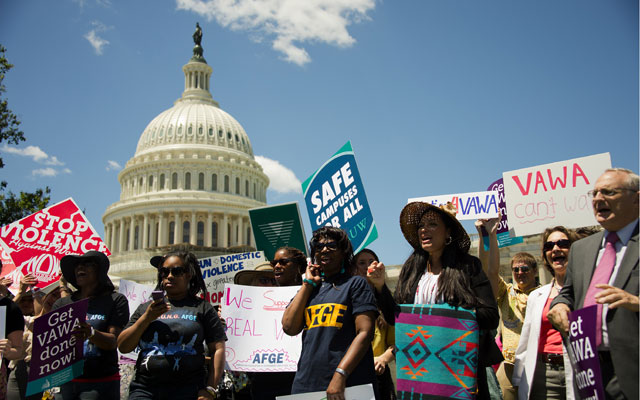Violence Against Women Act: Substitute Amendment Fails to Address the Underlying Problems
David B. Muhlhausen /
Fighting domestic violence is not, and never has been, a partisan issue. Everyone is against domestic violence.
However, Members of Congress should be concerned that the House of Representatives is considering the Violence Against Women Reauthorization Act (VAWA) of 2013 (S. 47), which has several troubling components, such as engaging in mission creep by expanding VAWA to men and prisoners and, without precedent, surrendering the rights of Americans who are not American Indians to racially exclusive tribal courts. Alarmingly, the tribal court expansion provision “violates Articles II and III of the Constitution.”
In an attempt to overcome some of these troubling issues, House Republicans are offering a substitute amendment. Despite the increased accountability provisions added to the VAWA grant application process (a much needed improvement), Members of Congress should still be concerned with flaws in the amendment.
First, as Heritage’s Paul Larkin detailed, the modified provision of the tribal court expansion in the substitute amendment still violates the Constitution.
Second, as it currently stands, Congress has little scientifically rigorous evidence that VAWA programs are succeeding at its original mission of protecting female victims of domestic violence. In addition, the substitute amendment does little to promote the rigorous evaluation of VAWA programs. For example, the amendment fails to require experimental evaluations of grant programs, which are the best method for assessing effectiveness.
Third, while the goal of helping domestic violence victims is admirable, Congress’s penchant for subsidizing the routine activities of state and local government programs continues the federal government’s march toward fiscal insolvency.
While S. 47 and the substitute amendment slightly reduces the amount of funding authorized for most of the VAWA grant programs, such authorization levels are still well above the amount allocated annually by Congress and asked for by President Obama. For the Services, Training, Officers, and Prosecutors (STOP) grants, S. 47 and the substitute amendment set the annual authorization level for fiscal year (FY) 2014 to FY 2018 to $222 million per year—down $3 million from the previous annual authorization of $225 million. However, President Obama has only requested $189 million for FY 2013, while Congress only appropriated $210 million in FY 2010.
In another example, the annual authorization level for FY 2014 to FY 2018 for Transitional Housing Assistance Grants are set at $35 million—an annual reduction of $5 million from the previous authorization of $40 million. For FY 2013, the Obama Administration only requested $22 million. In FY 2010, Congress appropriated $18 million for this grant program. Both sets of legislation are littered with such erroneous budget cuts that do virtually nothing to reign in out-of-control spending.
Fourth, the law enforcement battle to combat domestic violence is usually waged and budgeted by state and local governments. Every state has statutes that punish domestic violence and offers services to domestic violence victims. Using federal agencies and grant programs to fund these routinely state and local domestic violence programs is a misuse of federal resources and a distraction from concerns that truly are the province of the federal government. Simply expanding this framework with extensive new provisions and programs that have been inadequately assessed is likely to facilitate waste, fraud, and abuse and will not better protect women or victims of violence generally.
The current reauthorization efforts, S. 47 and the substitute amendments, are a gross distortion of the original law and are gravely flawed.

